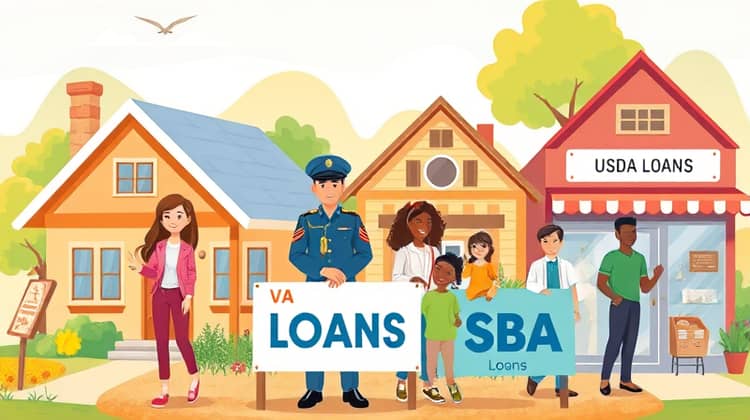Government-backed Loans: How to Apply and Get Approved

In today's financial landscape, navigating the world of loans can be daunting, especially for first-time borrowers. Government-backed loans can provide essential assistance and avenues for individuals looking to secure funding without the steep requirements of traditional loans. This guide simplifies the process of applying for and obtaining government-backed loans, ensuring applicants are well-informed.
Understanding what government-backed loans entail and how they function can help borrowers determine if they're the right fit for their needs. Whether you're looking to purchase your first home, finance education, or start a business, knowing the ins and outs of these loans is crucial to achieving your financial goals.
This article will cover important aspects such as eligibility, application processes, and tips for increasing approval chances, providing a comprehensive overview for anyone considering this borrowing option.
Understanding Government-backed Loans

Government-backed loans are financial loans guaranteed by government agencies, which significantly reduces risk for lenders. This backing allows lenders to offer loans at lower interest rates and with more favorable terms compared to conventional loans. Examples of government agencies involved in such loans include the Federal Housing Administration (FHA) and the Department of Veterans Affairs (VA).
These loans primarily benefit individuals who might struggle to qualify for traditional loans, such as first-time homebuyers, low-income families, or veterans. Knowing the features and advantages of government-backed loans can be a decisive factor in your financial planning.
- Lower interest rates
- Reduced down payment requirements
- More lenient credit score criteria
- Access to special programs for specific communities
Ultimately, government-backed loans serve as a vital resource for many seeking crucial funding in a fair and accessible manner. Understanding these benefits can empower borrowers to take informed financial steps.
Why Opt for Government-backed Loans?

Many individuals consider government-backed loans due to the advantages they offer. Primarily, these loans often feature lower interest rates, making them more affordable in the long run. The reduced cost can free up funds for other expenses, leading to healthier financial management.
Furthermore, government-backed loans typically require a lower down payment than traditional loans. For homebuyers, this means they can purchase a home sooner without needing to save a large sum of money upfront. This accessibility helps foster homeownership among various demographics, making property ownership a reality for many.
Additionally, thirdly, such loans usually come with flexible eligibility requirements, allowing a wider range of individuals to qualify. Lenders often consider the potential borrowers' circumstances rather than solely their credit history, promoting fairness in access to funds.
Common Types of Government-backed Loans

Several types of government-backed loans cater to different needs, making them a versatile choice for borrowers. Whether you seek a mortgage, education funding, or business capital, understanding these types can aid in choosing the right loan for your situation.
Some prominent options include:
- FHA Loans for first-time homebuyers
- VA Loans for veterans and active-duty military
- USDA Loans for rural property purchases
- SBA Loans for small businesses
Overall, these loans address various financial requirements and demographic needs, ensuring that adequate funding is available to eligible individuals. Understanding these options allows potential borrowers to make informed decisions.
Who is Eligible?

Eligibility requirements for government-backed loans vary by loan type but share some common criteria. Generally, these loans focus on aiding low to moderate-income individuals, first-time buyers, and special groups like veterans or rural residents.
While specific requirements depend on the agency backing the loan, most loans consider the applicant's income, credit history, and ability to repay the loan. Understanding these prerequisites is vital to efficiently navigating the loan application process.
- U.S. citizenship or permanent residency
- Credit score meeting agency-specific minimums
- Stable income and employment history
- Adequate debt-to-income ratio
Before applying, it's essential to verify personal eligibility against the requirements of the specific loan type to increase the likelihood of success.
How to Apply for a Government-backed Loan

Applying for a government-backed loan typically involves several key steps. Understanding these steps can significantly ease the application process and help ensure that applicants have the necessary documentation ready before approaching lenders.
To begin, prospective borrowers can follow these steps:
- Research the different types of government-backed loans available
- Gather necessary documentation, such as income proof, credit reports, and tax returns
- Choose a lender experienced in government-backed loans
- Complete the loan application process with the chosen lender
Completing these steps efficiently helps streamline the process and paves the way toward securing the needed funds.
Tips for Getting Approved

Securing approval for a government-backed loan can be competitive, and many borrowers seek ways to increase their chances of success. Adopting certain strategies before and during the application process can yield positive outcomes.
Here are some effective tips for improving the likelihood of loan approval:
- Maintain a good credit score by paying bills on time and reducing debt
- Save for a down payment to show financial responsibility
- Prepare a comprehensive loan application that includes all financial information
- Consider working with a mortgage broker to navigate the process more efficiently
Applying these strategies can enhance an applicant's credibility, signaling to lenders that they are responsible borrowers ready to manage their loans.
Conclusion

In conclusion, understanding government-backed loans can significantly impact an individual's financial journey, providing access to crucial funding for a variety of needs. Whether it's purchasing a home, funding education, or launching a business, these loans offer support that meets applicants where they are.
By exploring the types of loans available, eligibility criteria, and application processes, borrowers can empower themselves to make sound financial decisions. Those seeking assistance should approach the process with knowledge and preparation, maximizing their chances of securing the funding they require.
Still, like any financial product, government-backed loans come with their own risks and responsibilities. Borrowers must ensure they fully understand the terms and conditions associated with the loan to avoid pitfalls in the future.






